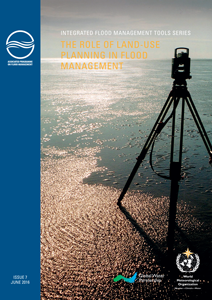Flood Management Tool Series, Technical Document No. 7 ¦ 2016
This Tool identifies the processes and policy principles that necessitate a linkage of land use planning in integrated flood management. It provides an overview of land use planning instruments considered applicable in the flood management context, to identify the challenges and opportunities to a closer linkage between the various sectors concerned and to provide guidance as to how those sectors can work together.
- World Bank Open Learning Campus. Sustainable Urban Land Use Planning (Self-paced).
Urban land use planning, if led by well-informed policies based on sustainable development principles and supported by well-planned and well-managed initiatives, including investments, can help address major urban challenges including climate change, resource scarcity, slum growth and increased poverty, and safety and security concerns. This e-learning course aims to: ensure that participants have a functional and integrated understanding of the dynamics of urban land use; and demonstrate how to effectively utilize policies and planning instruments to manage urban growth and achieve sustainable, equitable and efficient development outcomes. - Simonov, E., O. Nikitina, P. Osipov, E. Egidarev and A. Shalikovsky (2016). We and the Amur Floods: Lessons (Un)Learned?.
This short text summarizes the findings and conclusions from the report “We and the Amur Floods: Lessons (Un)Learned?” This research and fieldwork on the Amur River and assessment of its floodplains in 2013–2015 was supported by Rivers without Boundaries, Whitley Fund for Nature, DIPA, the Amur Branch of WWF-Russia, Global Green Grants Fund and others. The topic was selected because of the great flood that took place along the transboundary Amur River in the summer and autumn of 2013. The report serves to explore feasible options for the integrated flood management jointly implemented by Russia and China. - Bergsma, E. (2016). “Changed knowledge requirements for spatial flood governance“. Ecology and Society, 21(4): 40.
The analysis focuses on a case study in the Netherlands, where spatial-planning measures have recently been forwarded to broaden the strong safety paradigm that traditionally characterizes Dutch flood governance.
